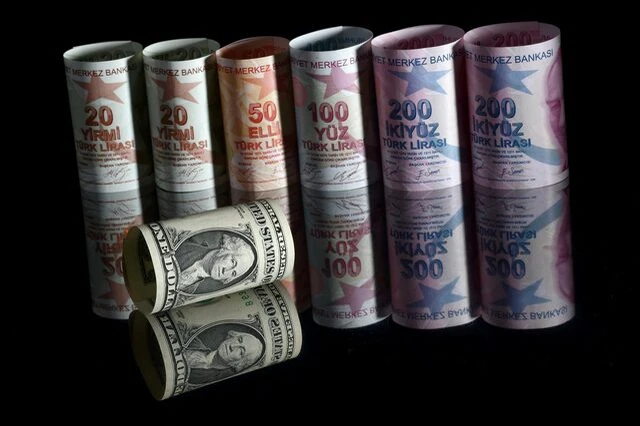Dollar fluctuates amid global economic pressures, domestic market trends
 A U.S. one dollar banknote is seen next to Turkish lira banknotes in this illustration taken in Istanbul, Türkiye November 23, 2021. (Reuters Photo)
A U.S. one dollar banknote is seen next to Turkish lira banknotes in this illustration taken in Istanbul, Türkiye November 23, 2021. (Reuters Photo)
The U.S. dollar retreated from the peak of ₺33.66 reached on Tuesday. The currency pair opened trading at ₺33.50 on Wednesday, indicating a slight pullback.
Analysts attribute the recent volatility to a combination of global and domestic economic factors. Comments from Japan’s Deputy Central Bank Governor Shinichi Uchida reaffirming the continuation of the country’s loose monetary policy stance have strengthened the dollar against the yen, reducing risks linked to ‘carry trade’ transactions.
For the time being, traders are eyeing ₺33.48 as a potential support level for the dollar-lira exchange rate, while ₺33.60 remains a key resistance point.
Global economic tensions impact Turkish markets
Global economic tensions – including recession concerns in the U.S., a robust Japanese yen, and geopolitical risks in the Middle East – are influencing Turkish markets. Following a period of stability, the dollar experienced a modest rise, hitting an all-time high of ₺33.66 before slightly retreating.
In the interbank market, the dollar opened at ₺33.5 on Aug. 7, 2024. Transactions at exchange offices in the Grand Bazaar range from ₺33.41 to ₺33.51. Despite a decrease in the dollar index (DXY) this week, emerging market currencies, including the Turkish lira, have depreciated due to a reduced global risk appetite.
Japanese yen crisis affects global ‘carry trade’
The Japanese yen crisis has heightened scrutiny of global carry trade transactions. Uchida’s announcement to maintain a loose monetary policy amid market volatility has led to a rebound of the dollar against the yen.
The U.S. dollar and Japanese yen pair, which had fallen to 141 yen earlier this week, has risen above 147 yen on Wednesday, mitigating some risks associated with carry trade activities.
The strengthening dollar has also impacted the Turkish lira, with the pair currently trading around ₺33.5. Immediate support and resistance levels for the dollar-lira pair remain at ₺33.48 and ₺33.6, respectively.
Interest rates and foreign investment trends
On the other hand, domestic interest rates are trending upward. Foreign investors, who have purchased nearly $10 billion in Turkish bonds this year, have recently started selling, pushing the two-year benchmark bond yield toward 43%. Additionally, overnight Turkish lira interest rates climbed to 52.78% on Tuesday, marking a one-month high. This rise in interest rates is expected to provide support for the Turkish lira.



